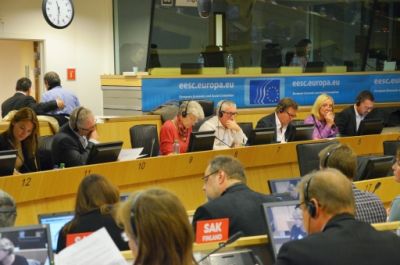
Adopted by the ETUC Executive Committee at its meeting on 10-11 March 2015
The political change in Greece is an opportunity, not only for that crisis-ridden country but also for a fundamental reassessment and revision of EU economic and social policies focusing on failed austerity and structural reforms of the labour market.
We highlight once again the criticism already voiced on many occasions in the past by ETUC: right from the outset, the key conditions under which Greece receives financial assistance did not deserve the label ‘reform’. The billions of euros that have flowed into Greece have been used primarily to repay existing debt stabilise the financial sector. At the same time, the country has been driven into deep recession by brutal cutbacks in government spending that have made Greece the most heavily indebted country in the entire EU. The consequence is a social and humanitarian crisis without precedent in Europe. One third of the population is living in poverty, the welfare state has been hugely weakened, the minimum wage cut by 22%, with discriminatory conditions for young people; the collective bargaining system and other protections for those still in work dismantled; while the burden of taxation on the lower income groups has been increased. Unemployment now stands at 27%, while youth unemployment exceeds 50%. Access to education has been curtailed. Many people do not have the means to pay for food, electricity, heating and accommodation. A large share of the population no longer has health insurance and can access medical care only in emergencies. The election results are a consequence of these failed policies. .
All this had nothing to do with reforms designed to address Greece’s actual problems. None of the country’s structural problems has been solved, but additional ones have certainly been created. This has been a policy of cutback and destruction, not rebuilding. Genuine structural reforms worthy of the name would have led to the emergence of new opportunities for economic development rather than driving a highly qualified generation of young people abroad. Genuine structural reforms would have included serious attempts to tackle tax evasion. Genuine structural reforms would have tackled clientelism and corruption in public procurement.
Unfortunately the note, recently presented by the presidents of the Commission, the ECB, the Council and the Euro group on preparing the next steps for better economic governance offers no perspective to change these failed policies.
However President Juncker's call on the Eurogroup to act to maintain the irreversibility of the Euro is welcome. A Greek - or any other country's - exit from the Euro area would only trigger financial turmoil detrimental to ordinary citizens and workers.
In all European countries, as in Greece, it is necessary to restore a strong industrial relation system and collective bargaining and to implement a large-scale European investment plan for sustainable growth and quality jobs- as demanded by the ETUC. The EU must also have a plan addressing the wider debt problem.
The European project needs to regain its credibility in the eyes of all European working people. The ETUC supports concrete action towards that end.
